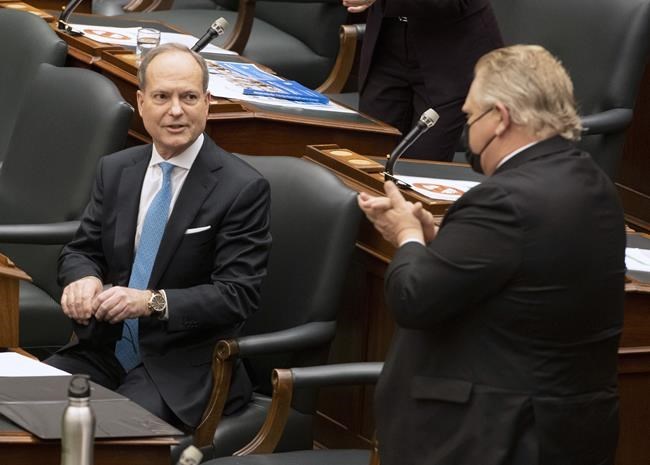TORONTO — Ontario is boosting health spending, investing more in roads and bridges, and phasing out COVID-19 supports as it charts a path out of the pandemic.
The province's fall economic statement released Thursday projects a deficit this fiscal year of $21.5 billion, lower than the budget's $33.1-billion projection - largely due to higher-than-expected tax revenues and stronger economic growth.
Finance Minister Peter Bethlenfalvy said investing in workers, health care and infrastructure is all linked.
"Our economy is a machine, and if one part of that machine is not working to its full potential, it holds all of us back," he said. "But if Ontario is firing on all cylinders, well, there's no place that you'd rather be."
Ontario is putting an additional $549 million over three years into home and community care to expand home-care services, funding an estimated 28,000 post-acute surgical patients and up to 21,000 patients with complex health conditions. It will help in providing nursing and therapy visits and personal support services, the government says.
As well, the province is set to spend $342 million to add and upgrade the skills of more than 5,000 registered nurses and registered practical nurses and 8,000 personal support workers. Another $57.6 million will go toward hiring 225 more nurse practitioners in long-term care, starting next year.
Ontario is also planning to spend $22 million over three years to integrate clinical information between hospitals and long-term care homes in order to streamline re-admissions and give information to families.
Another $29 million is being put toward mental health funding for health-care and long-term care workers, children and youth with eating disorders, and post-secondary students.
The government is allocating $2.6 billion for this year to expand and repair highways and bridges, as well as committing funding to advance the controversial Bradford Bypass and Highway 413 projects, though it hasn't said how much those roads will cost.
Opposition critics have questioned the value of those projects, including whether the routes were planned to benefit allies of Premier Doug Ford, how much time they will save commuters and the impacts to the environment.
The government has said Highway 413 would help alleviate congestion across the York, Peel and Halton regions. The Bradford Bypass would connect Highway 400 and Highway 404.
The NDP said it's not opposed to highways, but they should be built for the right reasons.
"There's no doubt that the Bradford Bypass and Highway 413 are motivated by political ambition," finance critic Catherine Fife said.
Green party leader Mike Schreiner said the road to COVID-19 recovery shouldn't pave over farmland.
"We’re in a climate emergency, but Doug Ford has his head buried in the concrete," Schreiner said in a statement. "The entire 200-page budget update mentions climate change just four times but highways 58 times."
Advocates and stakeholders decried a lack of new supports for small businesses, child care, education and innovators.
After putting $10.7 billion toward Ontario's COVID-19 time-limited funding this year, including school supports, the province plans to reduce it to $3.4 billion next year, and end it by 2023-24.
Bethlenfalvy said it's important to set aside enough funds to continue fighting COVID-19 because "things can turn very quickly."
Liberal Leader Steven Del Duca said pandemic supports should have included a vaccine mandate for hospital workers, which Ford declined to enact this week.
"We will not get to recovery unless we actually get through the rest of this pandemic as a province," he said.
Without including the COVID-19 time-limited funding, program spending is set to jump from $165.5 billion this year to $173 billion next year.
There are no tax cuts in the document, though the province is introducing a "staycation" tax credit. It would give Ontario residents 20 per cent on eligible accommodation expenses in 2022 for up to $1,000 for an individual or $2,000 for a family.
It is also extending the Ontario Seniors' Home Safety tax credit and the Ontario Jobs Training tax credit, and increasing a child-care tax credit by 20 per cent, providing support of an average $1,500, up from $1,250.
A $15 minimum wage, announced Tuesday by Ford, is in the legislation as part of the fall economic statement.
Ontario's deficit is projected to drop further to $19.6 billion in 2022-23, then $12.9 billion in 2023-24. The province's net debt is set to crack the $400-million mark this year, though the $402-billion projection is down from a $440-billion projection from the budget.
This report by The Canadian Press was first published Nov. 4, 2021.
Allison Jones, The Canadian Press

